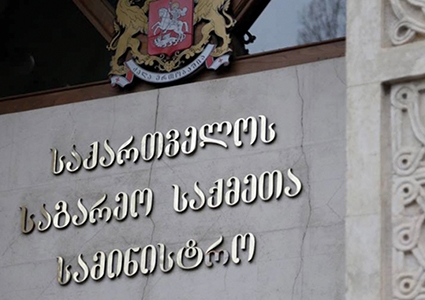April Geneva Int’l Discussions Again End in Disappointment
The Geneva International Discussions were launched in Geneva, Switzerland, in October 2008, in order to address the consequences of the 2008 August war between Russia and Georgia. The decision to create such a format was adopted according to the 12 August 2008 Ceasefire Agreement. Since then, the Geneva discussions are held four times a year. While they facilitate a dialogue between the parties, and are often used to communicate essential logistical and human security-related concerns, they have yet to produce any real progress towards Georgia’s demands of having its occupied territories returned to Tbilisi control, or towards the de facto governments of the occupied territories’ desire for recognition.
The most recent discussions, the 47th round, was held April 2-3. As they ended, Georgian Deputy Foreign Minister Lasha Darsalia spoke out about his disappointment in the discussions’ unproductive development. Speaking on behalf of the Government of Georgia, Darsalia blamed the failure of the talks on the Russian side’s “destructive attitude” and their preference for “the language of pressure and threats” over diplomatic negotiations. Russia politicizes all issues, including humanitarian concerns, said Darsalia, making it more difficult to enact policies from either side that would improve the quality of life of people living in the occupied regions of Abkhazia and Tskhinvali (“South Ossetia”).
In late March, Georgian President Salome Zurabishvili shared her position that the Geneva Discussions should be shifted in a more political and less technical direction, transforming into a higher-level diplomatic and political dialogue.
“The Geneva International Discussions format to resolve the conflict in Georgia's Occupied Territories needs to be changed into a higher level of diplomatic and political dialogue. We cannot resolve our conflict with a format that merely addresses technical issues,” Zurabishvili tweeted on March 25.
Presidential Spokesperson Khatia Moistsrapishvili explained Zurabishvili’s position in more detail, saying “it is necessary to use all the existing formats related to the occupied territories and conflicts, and to use all tribunes in order that we and our partners regularly remind the Russians of their obligations and to call for the obligations taken under various agreements to be adhered to.”
Zurabishvili is not suggesting a substitution of the Geneva Discussions with another format, said Moiststapishvili, but is concerned that “only technical issues are solved within this format. It does not respond to political demands. Consequently…it is necessary to update this format to include essential political dialogue. If this happens within the Geneva format, we welcome it, otherwise, other ways should be found to conduct a political dialogue,” she explained.
“They need to understand in Russia that in the 21st century, aggressive politics should be left behind,” Zurabishvili told MPs during a speech to Parliament after returning from her most recent international tour.
The de facto Foreign Minister of Abkhazia, Daur Kove, called Zurabishvili’s suggestions “worthless” and insisted that Georgia sign an agreement on non-use of force with its two occupied territories Abkhazia and South Ossetia, although a unilateral non-use of force pledge was made by the Georgian government in 2010. “Sadly, we see unconstructive approaches from the Georgian side,” said Kove.
Continuing his review of the 47th Geneva Discussions, Darsalia explained that “the Georgian delegation raised the issue of activating the relevant international security mechanisms to ensure that [Russia] fulfills the six-point ceasefire agreement…Unfortunately, on the tenth anniversary [of the Russia-Georgia war], Russia still does not fulfil its obligations.”
During the meetings, the Russian side expressed concern over joint NATO-Georgia military drills conducted in Georgia, which, warned Russian Deputy Foreign Minister Grigory Karasin, could position Georgia as “a springboard for tensions in the Caucasus.”
Karasin noted that his government is concerned with NATO “approaching the borders of the Russian Federation and its allies: Abkhazia and South Ossetia” and that they must ensure that military drills are “not addressed against us.”
“We will take relevant measures if necessary,” Karasin cautioned.
Another issue on the agenda was the recent, rather murky death of Georgian citizen Irakli Kvaratskhelia in Russian-occupied Abkhazia. Karasin refused to discuss the topic, however, as investigations into Kvaratskhelia’s death are ongoing. He brushed aside the issue, saying “If we discuss only such tragic cases at the Geneva Discussions, we cannot move forward.”
The Government of Georgia, the de-facto representatives of Abkhazia and Tskhinvali regions, the Governments of Russia, the United States, the United Nations, the OSCE and the European Union participate in the Geneva International Discussions. The talks usually contain two meeting-groups – the first for discussing security and stability issues in Georgia’s occupied territories, and the second meeting for negotiating the return of internally displaced persons and refugees to their homes.
The 48th round of the Geneva International Discussions will be held July 2-3, 2019.
By Samantha Guthrie
Image source: Ministry of Foreign Affairs of Georgia












